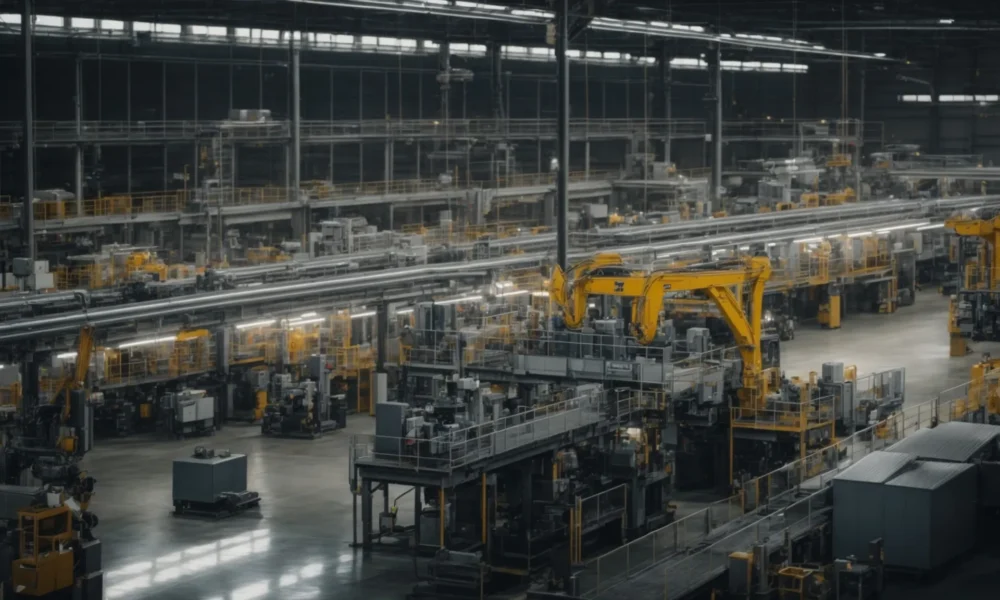For industrial operations to achieve peak efficiency and productivity, a diverse array of tools and systems is paramount. From sophisticated automation technologies to predictive maintenance software, the modern industrial landscape is infused with innovations designed to streamline processes and reduce costly downtime. These critical tools not only bolster production rates but also ensure workplace safety and regulatory compliance. Below, we delve into the essential instruments and systems that are vital to the success of today’s industrial enterprises.
Innovative Equipment for Enhanced Process Efficiency
In the heart of every industrial operation lies the need for advanced machinery that ensures precision, speed, and consistent output quality, all while reducing the strain on human labor. Technological advancements have made equipment smarter and more adaptable, with machines now capable of predicting maintenance needs and scheduling their own downtime to improve efficiency. For professionals seeking high-quality industrial apparatus, you can find what you need at Genemco.com, a trusted provider of a diverse array of options.
Efficiency goes beyond operational speed, encompassing energy use and waste reduction. Machinery with better energy ratings lowers costs and supports environmental sustainability. Integrating networking monitoring tools further enhances operational oversight, making it easier to maintain peak performance and sustainability goals.
Streamlining Production with Advanced Automation Systems
Automation systems are the backbone of modern industry, enabling high-volume production with minimal manual intervention. Robotics and automated workflows boost efficiency by handling repetitive tasks with precision, leading to increased profitability. These systems now handle complex processes like assembling electronic components and performing delicate quality inspections.
Automation also extends into digital realms, with software managing supply chains, inventory, work orders, and customer relationships, ensuring seamless operations. Transitioning to automation requires careful planning, proper workforce training, and a gradual shift in operation models to avoid disrupting existing production ecosystems.
The Role of Predictive Maintenance Software in Minimizing Downtime
Predictive maintenance software leverages machine learning and data analytics to forecast equipment malfunctions before they happen, enabling preemptive repairs. This approach helps businesses avoid costly unplanned downtime and extends the lifespan of their machinery by identifying operational patterns in real-time that humans might miss.
Though integrating predictive maintenance systems requires a significant investment, the long-term savings on repairs, materials, and production time make it worthwhile. These systems support environmental sustainability by reducing waste, while fostering continuous improvement through real-time machine communication and adjustments, aligning with lean manufacturing principles.
Enhancing Supply Chain Management with Integrated ERP Solutions
Enterprise resource planning (ERP) solutions are essential in supply chain management, centralizing all operations into one integrated system. This allows businesses to track and manage activities from procurement to delivery, enhancing visibility and enabling precise forecasting, better inventory management, and optimized resource allocation.
ERP systems are scalable, accommodating business growth or consolidation without sacrificing efficiency. They break down communication barriers between departments, promoting collaboration and streamlining decision-making. This results in a more agile, responsive business that consistently delivers customer satisfaction.
Safety and Compliance: Industrial IoT Devices for Real-Time Monitoring
The rise of the industrial Internet of Things (IoT) has transformed safety and compliance in facilities. By deploying sensors throughout, real-time monitoring alerts staff to potential risks and ensures adherence to regulations. These tools not only track equipment performance but also monitor environmental conditions like air quality and temperature, crucial for maintaining safe workplaces and regulatory compliance. This oversight not only supports workforce health but also enhances operational transparency, bolstering a company’s reputation for reliability and responsibility.
To effectively implement IoT devices, organizations need robust infrastructure and well-trained personnel. Ongoing education is essential to keep staff informed about the latest industrial monitoring technologies and compliance standards, ensuring continuous improvement in safety and operational practices.
Altogether, the incorporation of these sophisticated tools and systems is transforming industrial operations in unprecedented ways. From enhancing efficiency with high-tech equipment to safeguarding operations with IoT devices, the potential for improved performance and profitability is immense. Staying at the forefront of technological evolution is key for industries looking to maintain competitiveness and ensure long-term success.
